I want to get the last fragment in the backstack, or the current displayed it's the same for me, in the tab b_1. As you can see in the following image, I have a ViewPager, and another one inner tab b. Thus there are four current fragments displayed.
Question: How can I get the Fragment 2 instance?
I have seen another solutions, but none works for this scenario.
Annotation: The fragment to return is not necessary the hosted in the ViewPager. I can have opened two more fragments in a tab.
With this method I get all the current visible fragments, but not the one specific I want.
public ArrayList<Fragment> getVisibleFragment() {
List<Fragment> fragments = getSupportFragmentManager().getFragments();
ArrayList<Fragment> visibleFragments = new ArrayList<>();
if (fragments != null) {
for (Fragment fragment : fragments) {
if (fragment != null && fragment.isVisible())
visibleFragments.add(fragment);
}
}
return visibleFragments;
}
Some interesting code
activity_main.xml
<android.support.design.widget.CoordinatorLayout
xmlns:android="http://schemas.android.com/apk/res/android"
xmlns:app="http://schemas.android.com/apk/res-auto"
android:id="@+id/activity_main"
android:layout_width="match_parent"
android:layout_height="match_parent">
<android.support.design.widget.AppBarLayout
android:layout_width="match_parent"
android:layout_height="wrap_content"
android:theme="@style/ThemeOverlay.AppCompat.Dark.ActionBar">
<android.support.design.widget.TabLayout
android:id="@+id/tabs"
android:layout_width="match_parent"
android:layout_height="wrap_content"
app:tabMode="fixed"
app:tabGravity="fill"/>
</android.support.design.widget.AppBarLayout>
<android.support.v4.view.ViewPager
android:id="@+id/viewpager"
android:layout_width="match_parent"
android:layout_height="match_parent"
app:layout_behavior="@string/appbar_scrolling_view_behavior"/>
</android.support.design.widget.CoordinatorLayout>
MainActivity.java
public class MainActivity extends AppCompatActivity {
private static ViewPagerAdapter adapter;
private static ViewPager viewPager;
private TabLayout tabLayout;
protected void onCreate(Bundle savedInstanceState) {
super.onCreate(savedInstanceState);
setContentView(R.layout.activity_main);
viewPager = (ViewPager) findViewById(R.id.viewpager);
setupViewPager();
tabLayout = (TabLayout) findViewById(R.id.tabs);
tabLayout.setupWithViewPager(viewPager);
setupTabIcons();
}
private void setupViewPager() {
adapter = new ViewPagerAdapter(getSupportFragmentManager());
// Wrap with HostFragment to get separate tabbed nagivation.
adapter.addFrag(HostFragment.newInstance(new Fragment1()), null);
adapter.addFrag(HostFragment.newInstance(new RootFragment2()), null);
adapter.addFrag(HostFragment.newInstance(new Fragment4()), null);
viewPager.setAdapter(adapter);
viewPager.setOffscreenPageLimit(2);
}
public void openNewFragment(Fragment fragment) {
HostFragment hostFragment = (HostFragment) adapter.getItem(viewPager.getCurrentItem());
hostFragment.replaceFragment(fragment, true);
}
}
fragment_host.xml
<?xml version="1.0" encoding="utf-8"?>
<FrameLayout xmlns:android="http://schemas.android.com/apk/res/android"
android:id="@+id/hosted_fragment"
android:layout_width="match_parent"
android:layout_height="match_parent"/>
HostFragment.java
/**
* This class implements separate navigation for a tabbed viewpager.
*
* Based on https://medium.com/@nilan/separate-back-navigation-for-
* a-tabbed-view-pager-in-android-459859f607e4#.u96of4m4x
*/
public class HostFragment extends BackStackFragment {
private Fragment fragment;
@Override
public View onCreateView(LayoutInflater inflater, ViewGroup container,
Bundle savedInstanceState) {
super.onCreateView(inflater, container, savedInstanceState);
View view = inflater.inflate(R.layout.fragment_host, container, false);
if (fragment != null) {
replaceFragment(fragment, false);
}
return view;
}
public void replaceFragment(Fragment fragment, boolean addToBackstack) {
if (addToBackstack) {
getChildFragmentManager().beginTransaction().replace(R.id.hosted_fragment, fragment).addToBackStack(null).commit();
} else {
getChildFragmentManager().beginTransaction().replace(R.id.hosted_fragment, fragment).commit();
}
}
public static HostFragment newInstance(Fragment fragment) {
HostFragment hostFragment = new HostFragment();
hostFragment.fragment = fragment;
return hostFragment;
}
public Fragment getFragment() {
return fragment;
}
}
fragment2_root.xml
<LinearLayout
xmlns:android="http://schemas.android.com/apk/res/android"
xmlns:app="http://schemas.android.com/apk/res-auto"
android:id="@+id/fragment2_root"
android:layout_width="match_parent"
android:layout_height="match_parent"
android:orientation="vertical">
<android.support.design.widget.TabLayout
android:id="@+id/tab2_tabs"
android:layout_width="match_parent"
android:layout_height="wrap_content"
app:tabMode="fixed"
app:tabGravity="fill"/>
<android.support.v4.view.ViewPager
android:id="@+id/tab2_viewpager"
android:layout_width="match_parent"
android:layout_height="match_parent"
app:layout_behavior="@string/appbar_scrolling_view_behavior"/>
</LinearLayout>
RootFragment2.java
public class RootFragment2 extends Fragment {
private ViewPagerAdapter adapter;
private ViewPager viewPager;
@Override
public View onCreateView(LayoutInflater inflater, ViewGroup container,
Bundle savedInstanceState) {
super.onCreate(savedInstanceState);
// Inflate the layout for this fragment.
View root = inflater.inflate(R.layout.fragment2_root, container, false);
viewPager = (ViewPager) root.findViewById(R.id.tab2_viewpager);
setupViewPager(viewPager);
TabLayout tabLayout = (TabLayout) root.findViewById(R.id.tab2_tabs);
tabLayout.setupWithViewPager(viewPager);
return root;
}
private void setupViewPager(ViewPager viewPager) {
adapter = new ViewPagerAdapter(getActivity().getSupportFragmentManager());
// Wrap with HostFragment to get separate tabbed nagivation.
adapter.addFrag(HostFragment.newInstance(new Fragment2()), null);
adapter.addFrag(HostFragment.newInstance(new Fragment3()), null);
viewPager.setAdapter(adapter);
viewPager.setOffscreenPageLimit(1);
}
public ViewPagerAdapter getAdapter() {
return adapter;
}
public ViewPager getViewPager() {
return viewPager;
}
}

